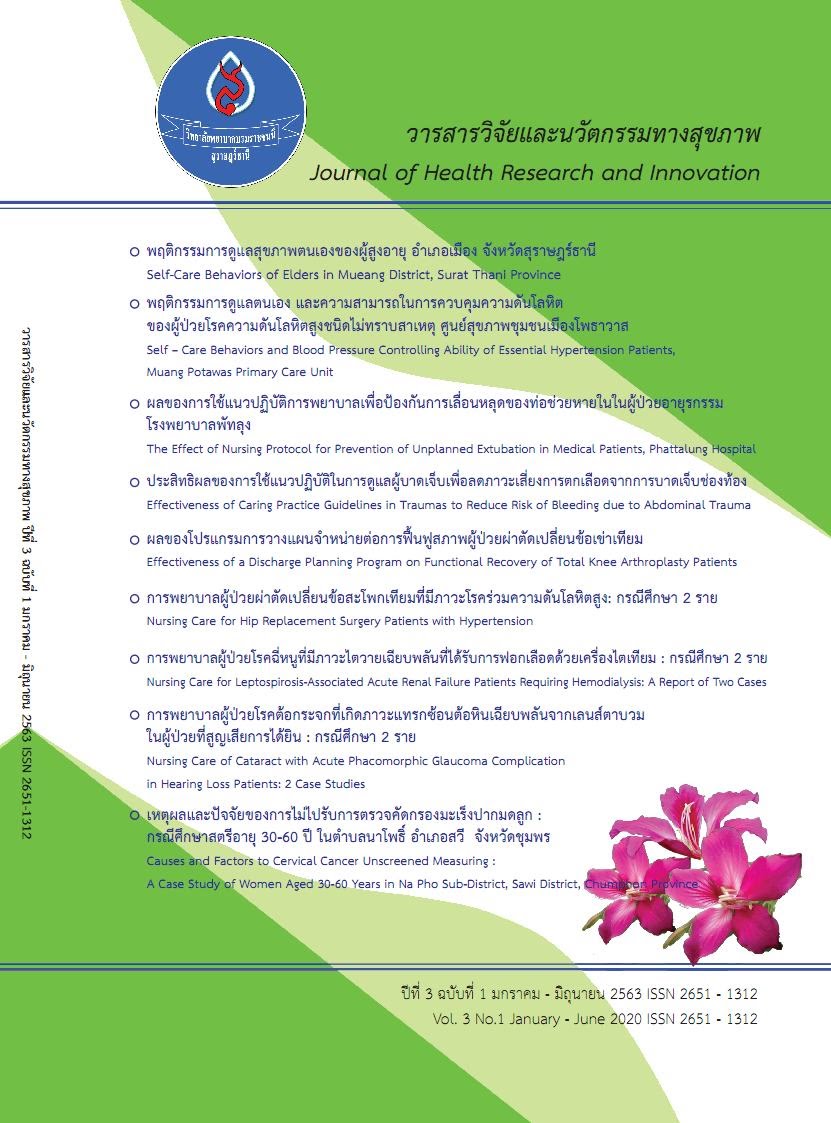พฤติกรรมการดูแลตนเอง และความสามารถในการควบคุมความดันโลหิต ของผู้ป่วยโรคความดันโลหิตสูงชนิดไม่ทราบสาเหตุ ศูนย์สุขภาพชุมชนเมืองโพธาวาส
คำสำคัญ:
การควบคุมความดันโลหิต, โรคความดันโลหิตสูง, พฤติกรรมการดูแลตนเองบทคัดย่อ
การวิจัยภาคตัดขวางนี้ มีวัตถุประสงค์เพื่อศึกษาความรู้เกี่ยวกับโรคความดันโลหิตสูง พฤติกรรมการดูแลตนเอง ความสามารถในการควบคุมความดันโลหิต และปัจจัยที่สัมพันธ์กับความสามารถในการควบคุมความดันโลหิต ของผู้ป่วยโรคความดันโลหิตสูงชนิดไม่ทราบสาเหตุที่ส่งต่อมาจากโรงพยาบาล / เข้ารับการรักษาที่ศูนย์สุขภาพชุมชนเมืองโพธาวาส จำนวน 194 คน ซึ่งได้จากการสุ่มตัวอย่างแบบง่าย เก็บข้อมูลโดยใช้แบบสอบถาม และแบบบันทึกข้อมูลการรักษาพยาบาล วิเคราะห์ข้อมูลโดยใช้สถิติเชิงพรรณนา และ Chi-square test พบผลการศึกษา ดังนี้
ผู้ป่วยโรคความดันโลหิตสูง ร้อยละ 64.9 มีความรู้เกี่ยวกับโรคความดันโลหิตสูงในระดับดี รองลงมา ร้อยละ 25.8 และ 9.3 มีความรู้ในระดับปานกลาง และตํ่า ตามลำดับ มีพฤติกรรมการดูแลตนเองในระดับปานกลาง ร้อยละ 49.5 รองลงมา ร้อยละ 47.4 และ 3.1 มีพฤติกรรมการดูแลตนเอง ในระดับดี และตํ่า สามารถควบคุมความดันโลหิตได้ ร้อยละ 37.6 ทั้งนี้ พฤติกรรมการดูแลตนเอง มีความสัมพันธ์กับความสามารถในการควบคุมความดันโลหิต อย่างมีนัยสำคัญทางสถิติ (P-value < 0.05) ส่วนความรู้เกี่ยวกับโรคความดันโลหิตสูง และการได้รับการสนับสนุนทางสังคม ไม่มีความสัมพันธ์กับความสามารถในการควบคุมความดันโลหิต ผู้ป่วยโรคความดันโลหิตสูงเกิดภาวะแทรกซ้อน ร้อยละ 4.6 โดยเป็นโรคไต โรคหัวใจ และอัมพฤกษ์ ร้อยละ 3.6, 0.5 และ 0.5 ตามลำดับ
จากผลการศึกษา ควรส่งเสริมการปรับเปลี่ยนพฤติกรรมการดูแลตนเองของผู้ป่วยโรคความดันโลหิตสูง เพื่อให้สามารถควบคุมความดันโลหิตได้เพิ่มมากขึ้น
เอกสารอ้างอิง
Chitiwong, S., (2017). Self – care Behaviors and Hypertension Controlling Ability of Hypertension Patients, Napalai Hospital. Research report. (in Thai)
Chumi, P. 2020. Chronic non-communicable disease situations. (Online) 2020. [Retrieved May 19, 2020] Available URL http://110.164.147.155/kmhealth_new/Documment/blood/ knowlage/17.pdf
Cohen, S. & Will, T. A. (1995). Stress, Social Support and the Buffering Hypothesis. Psychological Bulletin. 98(2) 310-357.
Eakplakorn. W., et al. (2016). Report of the 5th thai health survey by physical exam 2014. Health Systems Research Institute. Nonthaburi: Graphic and design font publishe. (in Thai)
Jitdumrong, s., Plangsanor, s., & Chankhong, s., (2012). Hypertension controlling ability and self – care behavior s of patients who could and could not control blood pressure, Lumthamenchai Hospital, Nakhonratchasima Province. Research report. (in Thai)
Joint National Committee (JNC). The seventh report of the Joint National Committee on prevention, detection, evaluation, and treatment high blood pressure: National high blood pressure education program. (Online) (2017). [Retrieved March 13, 2020] Available URL: http///www.nhbl.nih.gov/ guidelines/ hypertension/ Express.pdf.
Kaplan, N. M. (2002). Kaplan’s clinical hypertension. (8th ed.). Philadelphia: Lippincott Williams & Wilkins.
Lawence, J. A., Catherin, M. C., & David, W. H. (2013). Effects of comprehensive lifestyle modification on blood pressure control. Journal of the American Medical Association. 289(16), 2083.
Muang Potawas Primary Care Unit. (2019). Hypertension patient report. Suratthani: Muang Potawas Primary Care Unit. (in Thai)
Nutaro, A. & Dangdomyut. P. (2013). Relaxation: Concepts and Practices. The Journal of Psychiatric Nursing and Mental Health, 17(1), 1-12. (in Thai)
Sueto. N., Jirapongsuwan. A., Rawiworrakul. R., & Tipayamongkholgul. M. (2019). The effect of a program to promote blood pressure control among 35 to 59 - years-old patients with uncontrolled hypertension. Journal of Public Health Nursing, 32(2), 96-114. (in Thai)
Sueto. N., Jirapongsuwan. A., Rawiworrakul. R., & Tipayamongkholgul. M. (2019). The effect of a program to promote blood pressure control among 35 to 59 - years-old patients with uncontrolled hypertension. Journal of Public Health Nursing, 32(2), 96-114. (in Thai)
Yamane, T. (1967) Statistics: An Introductory Analysis. London : John Weather Hill,Inc.
ดาวน์โหลด
เผยแพร่แล้ว
รูปแบบการอ้างอิง
ฉบับ
ประเภทบทความ
สัญญาอนุญาต
บทความที่ได้รับการตีพิมพ์เป็นลิขสิทธิ์ของวารสารวิทยาลัยพยาบาลบรมราชชนนี สุราษฎร์ธานี
ข้อความที่ปรากฏในบทความแต่ละเรื่องในวารสารวิชาการนี้เป็นความคิดเห็นส่วนตัวของผู้เขียนแต่ละท่านไม่เกี่ยวข้องกับวิทยาลัยพยาบาลบรมราชชนนี สุราษฎร์ธานี และคณาจารย์ท่านอื่นๆในวิทยาลัยฯ แต่อย่างใด ความรับผิดชอบองค์ประกอบทั้งหมดของบทความแต่ละเรื่องเป็นของผู้เขียนแต่ละท่าน หากมีความผิดพลาดใดๆ ผู้เขียนแต่ละท่านจะรับผิดชอบบทความของตนเองแต่ผู้เดียว



